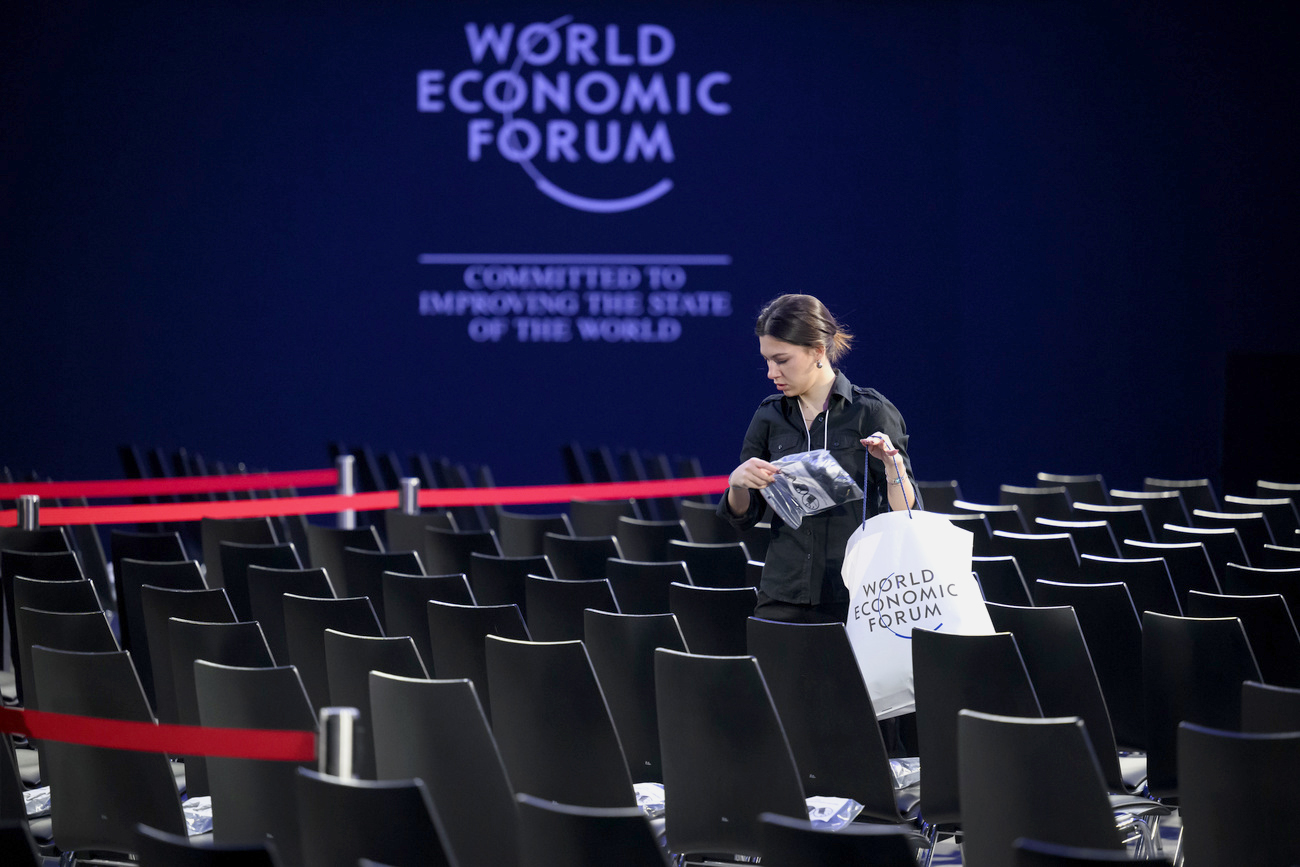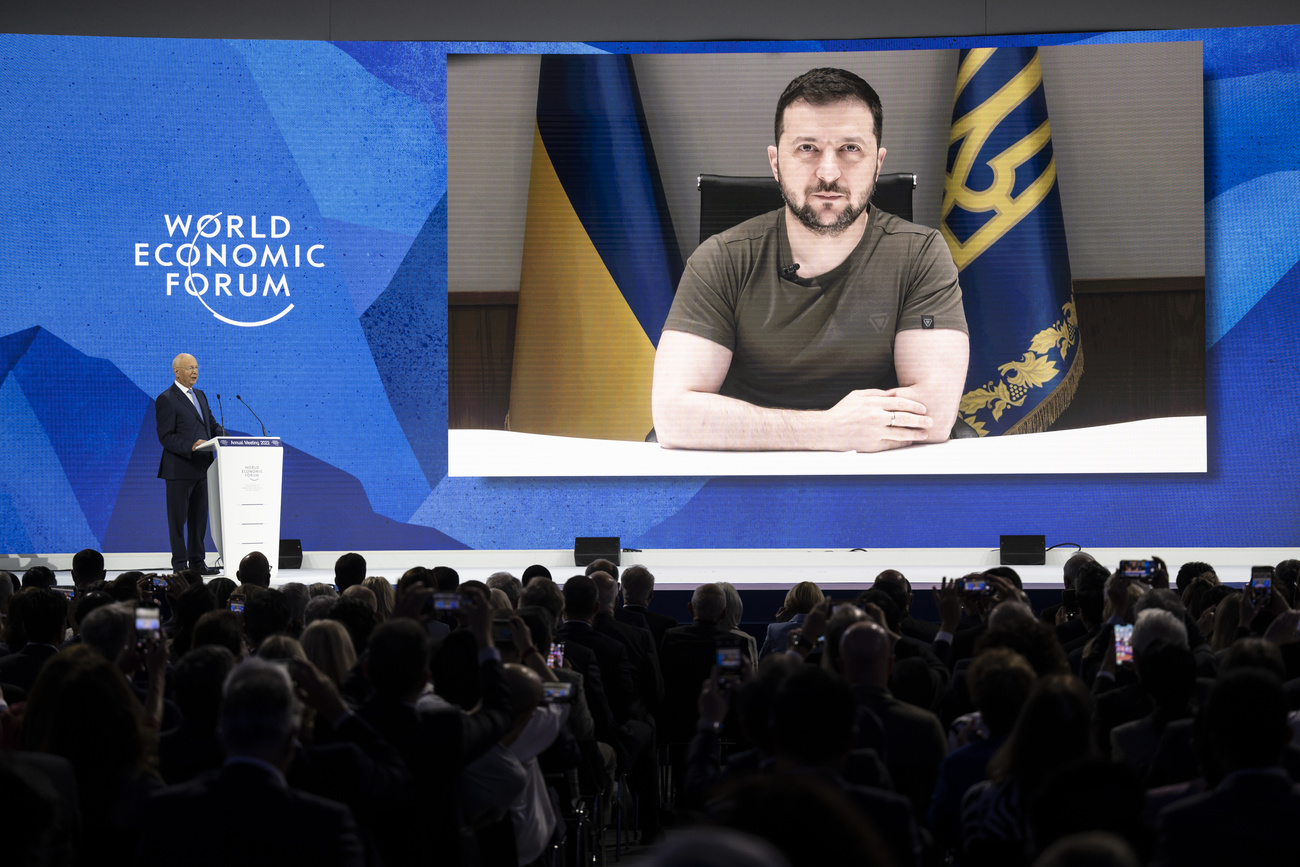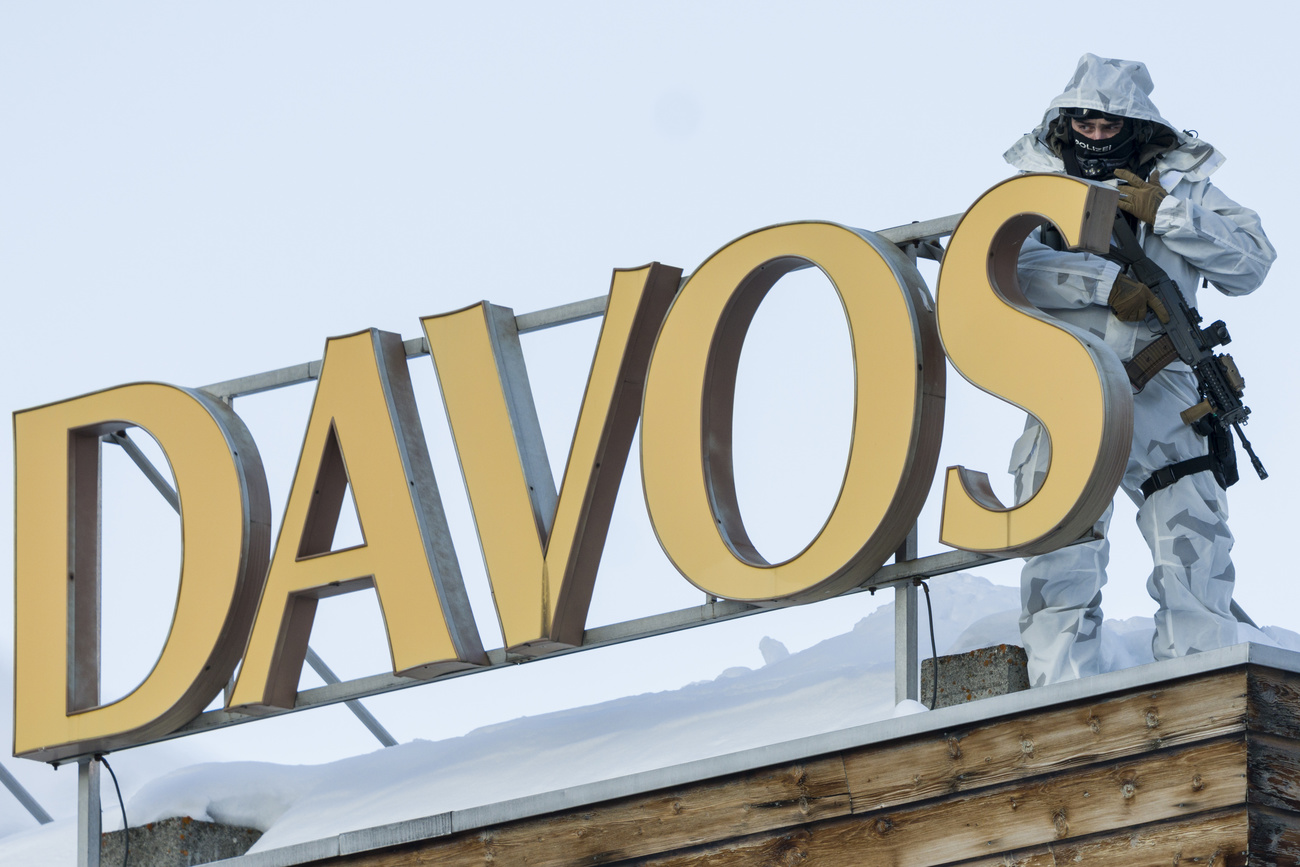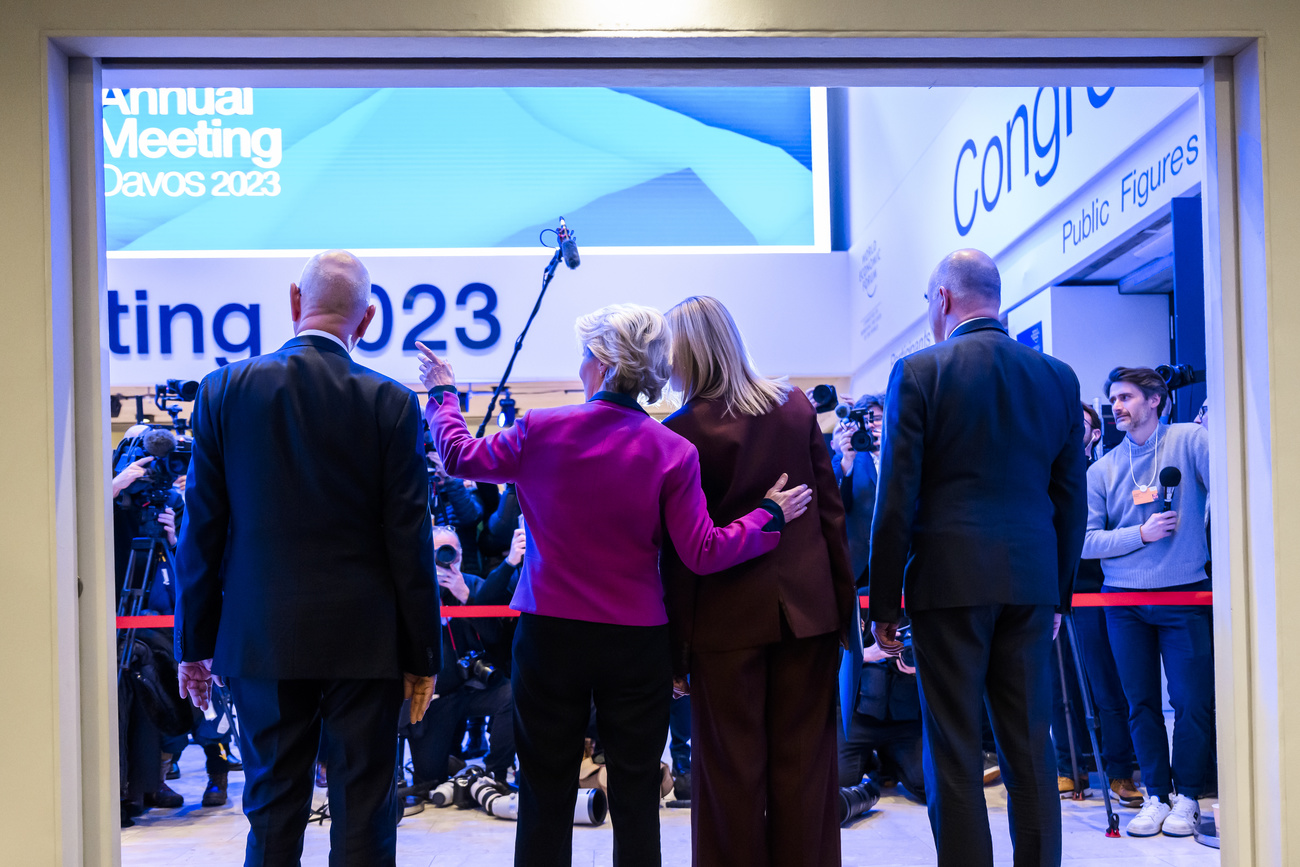Can WEF break the impasse on global governance of AI?

Governments are calling for trustworthy artificial intelligence (AI). But in the absence of global rules, this has proven difficult. Can there be a breakthrough at the World Economic Forum (WEF) meeting in Davos?
Just over a year ago, OpenAI’s popular system ChatGPT thrust AI into the mainstream, creating hope of a new era where technology can surpass human capabilities. It was also a wakeup call for governments to the risks of the technology from disruptions to democracy to seeing millions out of work.
Geopolitics have now entered the equation with countries aware that AI is more than just a technology: it is also a political and economic weapon, with China and the United States leading the race. Calls for regulation have emerged from industry to United Nations Secretary General António Guterres.

More
Who’s who at WEF and what it tells us about the world
While no “one size fits all” international solution has emerged, countries have agreed on the need for transparent and trustworthy AI models.
“There is not a consensus around the world on which areas of regulation should be internationalised,” Robert Trager, director of the Oxford Martin AI Governance Initiative at the University of Oxford, told an audience at the AI Policy Summit in Zurich in November. “Countries have different societal values when it comes to transparency and privacy.”
With this backdrop, the WEF has said it wants to take the reins of global governance of AI and use the Davos meeting to focus on “guardrails, governance and guidelines for innovation” according to WEF managing director Jeremy Jurgens, who leads WEF’s work on technology and innovation.
In June 2023 it launched the AI Governance AllianceExternal link, which brings together various governments, academics and over 40 companies, including OpenAI and tech giants like Microsoft, Alphabet, Meta. The alliance held its first event in San Francisco in November.

More
The ethics of artificial intelligence
Under the theme “Rebuilding Trust”, the annual gatheringExternal link in Davos, Switzerland, which starts on January 15, is a chance for WEF to show it can bridge divides and convince countries to take concrete actions for the responsible development of AI. But WEF has huge hurdles to overcome if there is to be a breakthrough in the Swiss mountain resort.
Getting countries on the same page
To make headway, WEF will have to find common ground among countries at a time when national initiatives are proliferating, say AI experts. According to the OECD AI Policy ObservatoryExternal link, there are currently over 700 national AI policy initiatives from 60 countries and territories.
These reflect countries’ diverging views on the role and purpose of regulation. In July, Chinese regulators introduced rulesExternal link on generative AI services with the specific aim to prevent the development and use of AI that contravenes “socialist” values and undermines Beijing’s regime. Facial recognition technology has been implemented nationwide as a means to keep social order.
This contrasts with initiatives in Europe that prioritise the protection of fundamental rights. For example, the Europe AI Act agreed by European Union member states in December heavily restricts facial recognition and AI for social scoring based on social behaviour or personal characteristics.
“The EU AI Act is the first law that builds a bridge between the tech world and democracy,” said Paul Nemitz, Principal Adviser on Digital Transition at the European Commission, at the AI Policy Summit.

More
Has Switzerland missed the train on AI regulation?
In the US, meanwhile, there’s more onus on industry to regulate itself amid concerns about thwarting innovation. This can be seen in the US government’s blueprint for an AI bill of rights released in 2022 as well as a recent presidential executive order on trustworthy AI, which sets standards for AI safety and security but not hard law.
As large economies haggle over how to build trust in AI, other countries have little say. UNESCO put forward a recommendationExternal link on ethics of AI back in 2021, in which it warned that algorithms could reproduce and reinforce existing biases, and thus exacerbate inequalities between North and South.
Most of the technology, and the data sets behind it are coming from just a handful of rich countries which are shaping the rules. Powerful new foundation AI models trained with broad data so that they can be applied to many sectors and uses, such as ChatGPT, are not being applied equally around the world, in part because large language models are significantly worse in languages other than English.
“We need an extraordinary effort to ensure that everybody benefits from AI,” Gabriela Ramos, Assistant Director-General for the Social and Human Sciences of UNESCO, told SWI swissinfo.ch.
WEF says it will bring the UN, industry and individual states to the table. UN undersecretary-general envoy for technology Amandeep Gill and several big tech top leaders such as Microsoft vice chair and president Brad Smith and Google and Alphabet global affairs president Ken Walker will be present. Some 60 heads of state and government will be present including from countries such as Switzerland, France, China and South Korea.
But one big question is how much government representatives for the US and China, which are leading AI development, will engage in the discussions. It is also still to be seen if many developing nations and civil society will be invited to the discussion table. “We need multilateral discussions to make these global rules work for a technology that knows no borders,” Ramos stressed.
Transparency for the good of humanity
WEF doesn’t just have to align governments, it also has to convince AI developers and users, the majority of which are private companies, that global governance is in their interest.
The biggest hurdle is transparency, specifically how much companies should reveal about their data sources and how they develop their AI models.
“Transparency should be a guiding force for governance of AI,” said Antoine Bosselut, who leads natural language processing systems at the Federal Institute of Lausanne (EPFL). “We don’t gain much by keeping these things in the dark. Ultimately, the more we know about these systems and the way they’re trained, the better it is to be able to make decisions that benefit society.”
More
Bosselut is one of 75 academics who joined the Swiss AI initiative, launched last November, that has put transparency at the forefront of future AI developments. This openness is fundamental to ensuring that “AI serves all of mankind and not just a select few,” said Hanna Brahme, curator of the AI HouseExternal link Davos hosted by the federal technology institute ETH Zurich and EPFL together with other partners.
The fact that the meeting takes place in Switzerland, with its reputation for neutrality, many multinational companies, strong technical know-how and humanitarian values, could play to WEF’s advantage said Brahme.
WEF has not said though how it plans to push for more transparency, which has declined in the last three years, according to a studyExternal link by Stanford University. Researchers graded 10 popular AI models on 100 different transparency indicators, such as training data and how much compute was used. Even the most transparent model, Meta’s Llama 2, received a score of 53 out of 100.
Some developers argue that keeping a lid on models is a necessary security measure to prevent hacking. But there’s also a clear commercial interest. In 2023, investors poured nearly $10 billion into generative AI startups like OpenAI, more than double the $4.4 billion invested the year before. US chip maker Nvidia’s stock soared by 240% in 2023.

More
Inside Roche: Taking on the tech sector
AI adopters, including multinational companies, also have a lot to gain. A spokesperson for Swiss pharma giant Roche told SWI that “recent advances in AI are similar to the major disruptions like electricity and internet that unleashed new waves of innovations”. Investment bank Morgan Stanley estimates that over the next decade, the use of AI in early-stage drug development could translate into an additional 50 novel therapies worth more than $50 billion in sales.
“The aim should not be to invent technologies that will make individual companies famous. It should be on solving a problem like human health. If we do that, we are on the right track,” Dorina Thanou, a senior researcher on AI for health at EPFL, told SWI.
WEF’s credibility question
Bridging these divides won’t be easy for WEF, according to experts, but there’s reason for optimism. WEF has a track record of kick-starting public-private initiatives – some of which have had real impact. The Global Alliance for Vaccines and Immunization (GAVI) was launched at the WEF annual meeting in 2000 and went on to help vaccinate 981 million children in the world’s poorest countries, preventing more than 16.2 million future deaths.
But WEF criticsExternal link argue that many initiatives have stayed within the walls of the Davos Congress Centre and were more about winning praise from the media and patting each other on the back than having a real impact. There’s a risk that a sort of AI-washing emerges, whereby participants tout the promise of AI and sign pledges to show progress while avoiding the tough issues and real accountability.

More
How ‘Davos Man’ hijacked capitalism
WEF also has its own credibility gap to overcome when it comes to being inclusive and transparent. The forum is viewed by many people as secretive, and the host of an exclusive gathering of elites catered to industry. When companies pay more than $120,000 to be members of WEF, can it really be trusted to have the global good in mind? This is something WEF critics have questioned for years.
But the fact that WEF can attract so many industry actors is also what makes it attractive. More than half of the 2,800 participants at the 2024 annual meeting are from business. “These stakeholders coming together can be very powerful,” said digital ethics expert Niniane Paeffgen in Geneva. AI is mainly developed by big tech companies far away from government centers so having them all together is crucial to advance the debate on global governance of AI and make sure that companies do their part for the responsible development of AI. “But in order to make this work, how things are discussed needs to change.” Specifically, she said, civil society needs to have a role.
Despite these concerns, experts think that a breakthrough at this year’s annual WEF meeting is possible, mainly because of its timing. There’s a sense of urgency to build some consensus just a few weeks after the EU took the historic step of agreeing on the first law on AI, which some argueExternal link could quickly become the global standard.
Edited by Virginie Mangin

In compliance with the JTI standards
More: SWI swissinfo.ch certified by the Journalism Trust Initiative












You can find an overview of ongoing debates with our journalists here . Please join us!
If you want to start a conversation about a topic raised in this article or want to report factual errors, email us at english@swissinfo.ch.